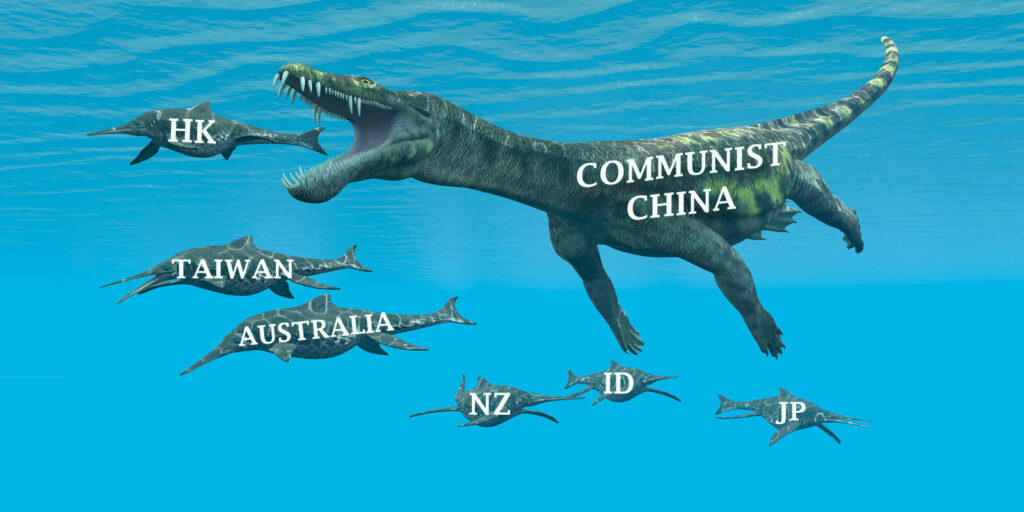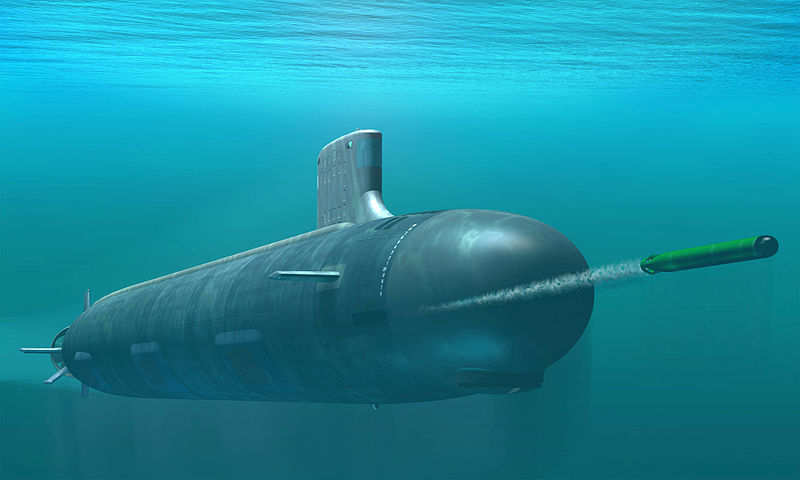Bayard & Holmes
~ Jay Holmes
On September 15, 2021, US President Biden announced that the United States is entering a new Security Agreement with Australia and the United Kingdom. He explained that a major feature of the new agreement will be the United States and the United Kingdom assisting Australia with the necessary technologies for building nuclear submarines. He also made it clear that, while the submarines would use nuclear propulsion, they would carry conventional (non-nuclear) weapons. The new agreement, which will include joint efforts in cyber security, applied artificial intelligence, and other defense technologies, has disrupted a multi-billion-dollar deal with France.
Thus far, statements from various government spokesmen for Australia, the United Kingdom, and the United States allude to shared strategy and technology development in areas such as supply chain security and other strategic issues. The details are, as yet, incomplete, or at least they have not yet been revealed to us, but clearly the agreement is broad in scope and has obviously developed over a period of years.
The general public might be surprised by these developments, but the writing has been on the wall for over a decade. The agreement is new, but the political forces and negotiations that led us to it are not.
Reactions Around the World
Reactions around the world to the new trilateral agreement have been predictable and, in many cases, highly entertaining for those who follow defense issues.
Not surprisingly, France is experiencing the strongest and most dramatic reaction. Part of Australia’s plan to build up to eight nuclear attack submarines includes Australia cancelling its purchase of fourteen or more French-designed diesel submarines. This means that France will lose $40 Billion or more in revenue from the expected Australian-French submarine deal. . . . Whoops.

Actual photo of Napoleon Bonaparte’s reflection in his mirror while suffering from his Macron Complex.
Listening to the French Government this week has led me to believe that Napoleon Bonaparte must have suffered from a Macron Complex. Macron and his government are angry. They are deeply shocked at the surprise of it all. Nearly as shocked as they are each December 25 when they are told it is Christmas. Who could possibly have seen it coming?
Well, anyone who has followed the Australian-French Submarine contract and China’s increasing belligerence toward its Pacific neighbors could see that something had to change. Add to this formula France’s ruthlessness toward the United Kingdom in the Brexit process, and you can easily see how we got “here from there.”
France has lagged behind schedule with the diesel-fueled submarine project, presenting increasing cost figures to Australia since their deal was first formulated in 2016. The Australian Ministry of Defense and the Royal Australian Navy have voiced their concerns to France in clear detail for the last three years. Key Australians (whose names I will deny knowing) have been expressing their concerns about the French-Australian project in increasing volume to various allies since the project was first formulated.
Members of the Australian Navy were worried that the new French submarines would not allow sufficient endurance and speed for effective patrols anywhere beyond Australian territorial waters. Someone in the Australian government (I’m guessing three key someones) had ignored their Navy’s concerns because they did not want to engage in conversations about nuclear propulsion for new submarines. The topic has just been too dicey for Australian politicians to engage upon it.
The China Factor
So what changed? Several key things in Australia, France, the United Kingdom, and the Pacific.
In Australia, allegations of kickbacks and bribes from their French submarine deal have been difficult to shake. At the same time, it was revealed that Communist China had completely succeeded in penetrating an Indian-French submarine building project in India. This was an intelligence coup for China. Australia was disappointed to learn that China is already building newer counter-measures to the submarines that Australia had yet to build.
Like all diesel submarines, the new French-designed Australian submarines were going to require time on the surface every night to recharge batteries. While on or near the surface, they would be vulnerable to detection and destruction.
After recharging they would still be limited in speed. They might have been capable of speeds up to 20 knots when submerged, but only for very brief periods. (Enter your submarine technology debates in the comment section below. I’m expecting them.) These limitations would have been tolerable when operating in friendly Australian waters but would not have allowed for safe or effective operations in the South China Sea, or as we prefer to call it, the West Los Angeles Sea.
In recent years, China has increased its satellite reconnaissance capabilities and its airborne submarine counter measure capabilities. A nuclear-powered submarine operating from Australia could arrive from Australian waters within a week and remain on patrol over seventy days before turning back toward Australia, and it could do so while remaining submerged the entire time.
This article is not intended to be a robust technology presentation on modern submarines. I am presenting a very simplified comparison between nuclear and non-nuclear submarines, but these are the salient facts that have been driving new submarine warfare planning and strategy in Australia.
While China was rapidly increasing its air, naval, and space capabilities in the Pacific, it was also practicing standard Communist Chinese diplomatic tactics.

Communist China’s diplomatic strategy has always been about as subtle and stealthy as a freight train. I call it the “scream and stomp your feet” method of diplomacy. For the Communist Chinese Party (CCP), diplomacy amounts to making demands and threats and seeing how far they can get without anyone effectively opposing them. It’s just primitive bullying. They do it all the time.
At home, the Chinese government can be as rude, crude, and offensive as it wishes. Chinese citizens are in no position to do anything but obey and pretend to agree. Any other response would get them vanished or sent to a labor camp.
China also uses this bullying approach on the international stage, thinking it’s the best way to get what it wants. Simultaneously, in schizophrenic fashion, the CCP knows that any sane foreigner would oppose China’s imperialist agenda and thuggish methods. Still, the Chinese pretend to be deeply offended when anyone opposes being mugged by China.
While China pretends to be offended by the new Australia-UK-US defense agreement, its feigned outrage changes nothing.
China has been ramping up an economic war against Australia and has been dumping huge sums of money into disinformation and manipulation campaigns there. China was being hostile toward all its Pacific neighbors (except for their pals in the North Korean asylum) before this agreement, and it will remain hostile after the agreement. The Australians heard the threats repeatedly screamed at them by their powerful problem neighbor to the north. In response, Australia decided to improve its chances of survival as a nation by purchasing nuclear-propelled submarines.
The bellicose pronouncements emanating from Beijing are predictable and, for most Westerners, they sound like a comic parody of China. Chinese diplomats almost always manage to become comic figures on the world stage.
Plan B
So, if I and so many other people know all this, how are the French so surprised?
They are not, but for their own domestic political reasons, the French need to pretend that they are deeply outraged and totally surprised. Macron and his crew are in no position to be honest with the French people about the loss of the Australian contract. Think how well would it play at the polls if Macron and his Macaronis said, “Well, yes, we will lose many billions of Euros for our economy and thousands of workers will be laid off, but we badly mismanaged the project and went to great lengths to punish the United Kingdom as much as possible for their Brexit, so we should all have seen this coming.” No, that would not help Macron’s popularity in France. He knows his constituents. Give them someone else to blame this on, and they’ll forget that Macron was a cause of the lost business rather than a victim of “backstabbing” by foreign governments.
Since telling the truth was not going to be profitable for Macron and his crew, they are following their usual Plan B option. They are invoking French National Pride and feigning outrage. They recalled their ambassadors from the United States and Australia.
Australia, the United Kingdom, and the United States are all keeping calm in the eye of this diplomatic hurricane. They can afford to. They know it’s a tempest in a teapot.
France is not going to stop trying to sell French defense products and other exports to Australia, the United Kingdom, the United States, or anyone else with cash. France is not going to forget that it needs NATO more than NATO needs them. France is not going to surrender to Communist China. France is not going to stop facilitating illegal aliens in its invasion of the United Kingdom. France can scream as much as it likes. It will change nothing.
Drama and histrionics aside what does this all mean?
For the United States, it means that it will not have to be the only nation operating high-speed, high-endurance submarines in the Pacific.
If, as planned, Australia, with substantial technical assistance from the United States and the United Kingdom, builds the infrastructure for nuclear propulsion submarines, then the United States and the United Kingdom will be able to dock their nuclear submarines in those facilities for temporary visits allowing for crew changes and resupply. Likewise, Australia would have the same option at US and UK nuclear sub bases. Some in the United States are asking if Australian submarines will become an excuse for yet more cuts in the US Navy budget in the form of more cancelled building projects. I hope not. Time will tell.
The US media and public response have been predictable. Depending on their political ideology, some people are claiming that this deal is yet more evidence that Trump or Biden is the Great Satan. Fortunately, many people do realize that not everything that occurs in the universe was caused by either Trump or Biden. This concept is unimaginable to some, but accepted by many.
The new agreement between Australia, the United Kingdom, and the United States is not about Democrats or Republicans. It’s not about liberals or conservatives. It’s not about staining the honor of our beloved French allies. It is, however, in large measure about Communist China’s primitive foreign policies and its insistence on continually threatening anyone who resists its hostility. It is a foreign policy issue, and when viewed through the lens of foreign policy, it makes sense.
 SPYCRAFT: Essentials
SPYCRAFT: Essentials
Click Here
What do the main intelligence agencies do and where do they operate? How do they recruit personnel? What are real life honey pots and sleeper agents? What about truth serums and enhanced interrogations? And what are the most common foibles of popular spy fiction?
With the voice of over forty-five years of experience in the Intelligence Community, Bayard & Holmes answer these questions and share information on espionage history, firearms of spycraft, tradecraft techniques, and the personalities and personal challenges of the men and women behind the myths.
Though crafted with advice and specific tips for writers, SPYCRAFT: Essentials is for anyone who wants to learn more about the inner workings of the Shadow World.
“From novices to experts, everyone will find something in this book.”
~ Doug Patteson, Former CIA Operations Officer
“For any author, this is the new bible for crafting stories of espionage.”
~ James Rollins, New York Times Bestselling Author of The Demon Crown

Recent Comments